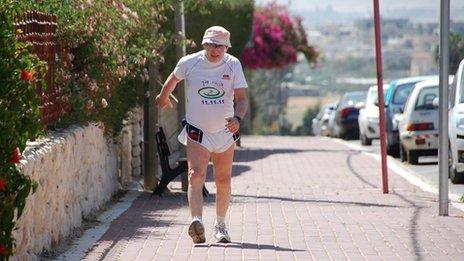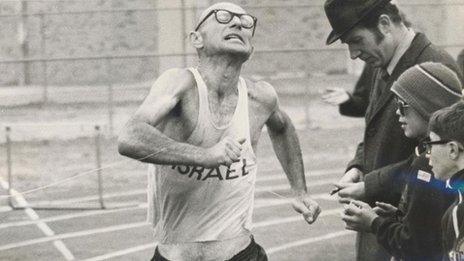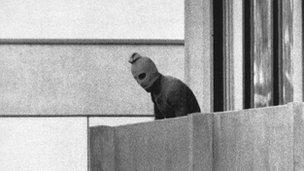Nazi camp survivor Shaul Ladany still setting the pace
- Published

Shaul Ladany believes stubbornness helped him win medal after medal
You might consider Shaul Ladany to be either the unluckiest man in the world. Or the luckiest. It's hard to decide which.
As a child, Shaul Ladany endured the Nazi concentration camp at Belsen; as an athlete he survived the attack by Palestinian gunmen on the Israeli delegation at the Munich games in 1972 in which 11 of his teammates were murdered.
Along the way, he lived through air-raids on his family home in Belgrade during the German blitzkrieg and hid from Nazi soldiers as they searched wartime Budapest for Jewish children.
Time after time, fate placed him in the most desperate circumstances. And yet somehow, time after time he survived.
There was a distinguished academic career too - and world records and world championships in the lonely, demanding discipline of race walking.
Oh. And there have been cancer scares too.
And after all that, he still marks his birthday every year by walking his own age in kilometres.
This year, that meant a 76km (47 mile) walk. And where Prof Ladany lives, near the Israeli city of Beersheva, walking is no relaxed suburban stroll. It means getting up before dawn to beat the heat of the forbidding Negev desert.
Race-walking may not grab many headlines at the Olympics but it is an event that requires a kind of fanatical dedication.
Nazi terror
The bustling swagger of its exaggerated heel-and-toe style is immensely physically demanding. One of Shaul Ladany's signature events is a race over 100km which requires extraordinary reserves of stamina and concentration.
Prof Ladany has been asked many times whether the difficulties and dangers he endured somehow equipped him for his solitary sport.
"I don't know," he told me. "What is sure is that to be a long-distance walker or runner you need to have that determination… that stubbornness."
His stories of life in wartime Europe still have the power to shock.
He describes the tension of being hidden among the Catholic children at a Silesian monastery as Nazi troops combed the streets of Budapest for Jews. He was terrified that his lack of familiarity with the Catholic prayers and rituals of worship would give him away.
He experienced the brutality of Belsen as an eight-year-old child and the feeling of being hungry all the time.
But Prof Ladany refuses invitations to introspection, almost as though his extraordinary gift for survival is like the complex mechanisms of a Swiss watch that might stop working if you pick over it too much.
He says: "In order to survive, you needed not luck but a long series of lucks… and you had to make various decisions and to do various things in order to help yourself." Eventually he poured that single-mindedness and determination into the lonely sport at which he came to excel. He was both a world champion and a world record holder.

In 1972, Prof Ladany broke the world speed record for a 50-mile walk
Lessons from history?
By the time of the Munich Olympics in 1972, he was a key member of the Israeli team, a champion in his sport.
The West German authorities, perhaps keen to erase the memory of Hitler's Olympics in 1936, tried to create the atmosphere of a kind of rolling global party in the Olympic Village.
It was a disaster.
Palestinian gunmen infiltrated the village and murdered 11 members of the Israeli team - some of the athletes and coaches were held hostage for many hours.
It was one of the first news events to unfold on live television in many countries as outside broadcast units sent to Germany for the sport relayed the grim drama around the world in real time.
Shaul Ladany once again survived. The gunmen burst into Apartments 1 and 3 of the building where he was staying. He was in Apartment 2 - the door in between.
It is possible the gunmen may have been put off attacking Apartment 2 because they knew two members of the Israeli shooting team were staying there and had their weapons with them. It is hard to be sure.
Shaul's view of the drama is matter of fact.
He assures me he felt no fear after the attack, and while he remembers the traumas through which he's lived in great detail, he says he doesn't suffer from nightmares.
He does believe, though, that Munich offers a kind of lesson from history to the organisers of this year's Olympics in London.

The grim drama at the Olympic village was played out on live television
"Before Munich", he said, "it was believed that the Olympics were in the framework of the ancient world; that there was a truce from all armed activity. That belief was shattered in Munich... now people from any place might use such a stage for terrorist activity."
Forty years on, Shaul Ladany remembers the events of Munich in sharp detail. But he has moved on to new challenges.
The task of walking his age in kilometres on every birthday will get tougher with every passing year, of course - he will be 77 next year.
He is determined to keep going far into the future. And when you consider the life of one of the great survivors of a turbulent century, surely no-one would bet against him.